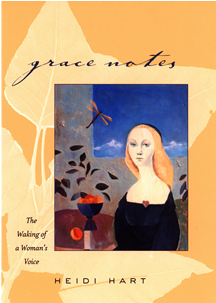
| Vol. 14 No. 2 | Fall 2004 |
![]()
by Tiffini Porter Widlansky
In music, a grace note is added as an embellishment to a finished composition. Written in by the composer or improvised by the performer, it temporarily displaces the melody, introducing dissonance into the harmony, before resolving back into the main note. The result is texture—a more satisfying and authentic experience.
 Heidi
Hart BA’92 captures the essence of that beautiful dissonance
in her elegantly crafted memoir, Grace Notes: The Waking of a Woman’s
Voice. Disillusioned with her Mormon upbringing, Hart chronicles
her struggle to find her own sense of spirituality and individuality—in
short, her voice. She writes, “If I am to understand my own history
of silence, I have to become a passaggio, that word that means
both corridor and journey. I have to move backward and try all the doors.”
Hart takes the reader through those doors, deftly moving between past
and present as she reflects on a long, difficult transition.
Heidi
Hart BA’92 captures the essence of that beautiful dissonance
in her elegantly crafted memoir, Grace Notes: The Waking of a Woman’s
Voice. Disillusioned with her Mormon upbringing, Hart chronicles
her struggle to find her own sense of spirituality and individuality—in
short, her voice. She writes, “If I am to understand my own history
of silence, I have to become a passaggio, that word that means
both corridor and journey. I have to move backward and try all the doors.”
Hart takes the reader through those doors, deftly moving between past
and present as she reflects on a long, difficult transition.
Drawing inspiration from the diary of a mute Quaker ancestor, Hart explores literature, feminist philosophy, and religious traditions ranging from Zuni mythology to Judaism on her way to finding comfort as a member of her ancestor’s beloved Society of Friends, the Quakers. She writes candidly about the impact of her life-altering decision on her relationships with family, friends, and, most poignantly, her husband, who remains a devout Mormon. While the subject matter is complex and potentially controversial, Hart does not let her narrative deteriorate into spectacle. Her tone is forthright, yet composed, the tenor of one who has found calm after a storm.
Hart, a poet, singer, and voice teacher, lives with her husband and two sons in Salt Lake City. Grace Notes is published by the University of Utah Press (2004), www.upress.utah.edu.
—Tiffini Porter Widlansky BS’96 is editorial assistant for Continuum.
| Heidi Hart will read from, discuss, and sign her book, Grace Notes: The Waking of a Woman’s Voice, at the Utah Humanities Council’s seventh annual Great Salt Lake Book Festival, held Sept. 18-19 at the Salt Lake City Main Library. For details about the festival schedule and participants, visit www.utahhumanities.org, or call (801) 359-9670. |